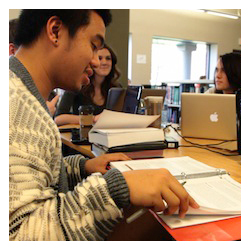A “Timely” Investment: how to study effectively and efficiently

Ask your prof how much time you should spend studying for the next test, and the most likely response will be “More.” That may (in the prof’s eyes, anyway), be true, but it’s not particularly helpful.
As you begin your studies at university—or continue them at high school—here are a few tips for scheduling how much and when to study.
1.
Invest according to payoff. Don’t lose perspective and invest too little or too much time preparing for a quiz or an exam. One way to manage this is by using the ‘Energy to Payoff’ formula. Cut the percentage of what an exam is worth in half to find the total number of hours you should invest in it. For example, an exam worth 20% of the final grade would require roughly 10 hours of total study time.
2.
Be short and intense. Try to limit your study sessions to a maximum of 1.5-2 hours. If you have 10 hours to devote to studying for an exam, investing two 5 hour sessions (cramming) will not be as effective as spending five 2 hour sessions spaced out over a week.
3.
Know your peak energy times. What time of the day are you most alert and able to do your best work? Research shows that 80% of our highest output and learning comes from only 20% of our time. When possible, align this productive time with study. Wisely schedule the ‘pain’ and pleasures of your day.
Don’t hesitate to take advantage of the programs and resources that are available to help you succeed, where ever you study. For example, at
Redeemer University College, there are many resources offered through the
Learning Services Office. It’s the perfect way to invest in your success.
account_balanceMore About This School
